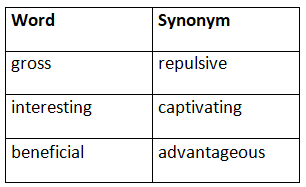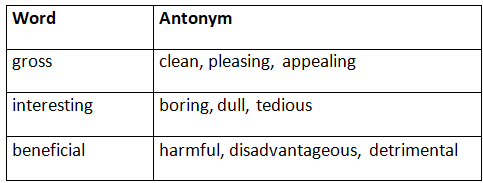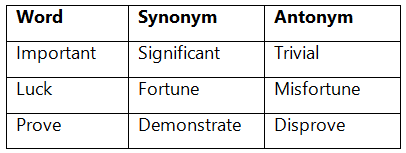Tips & Tricks: Synonyms and Antonyms - 2 | Tips & Tricks for Government Exams - Bank Exams PDF Download
Certainly! Could you express the identical concept using a variety of English words? Absolutely! By utilizing synonyms and antonyms, individuals can enrich their lexicon, enhance sentence structure, and circumvent redundancy. A synonym denotes a term that conveys a comparable meaning to another word. *Opt for a synonym when seeking an alternative to the word you currently have in mind. An antonym represents a word that signifies the contrary of another. *Select an antonym when desiring a word that opposes the meaning of the one you're considering.
Synonyms
Suppose you're composing a research paper for a biology course, and you aim to convey that bacteria elicit a sense of disgust. As the term "gross" might appear overly informal for a scientific context, opting for a synonym is advisable.
In the chart below is a list of synonyms:
Antonyms
Consider a scenario where you're perusing an article for the aforementioned paper, which delves into the beneficial aspects of bacteria. If your thesis were framed as "Bacteria are 'bad' for You," it would be prudent to select a term that conveys the opposite meaning of "bad." Hence, an antonym would be the most suitable choice.
In the chart below is a list of antonyms:
Note that the words on the right mean the opposite. Remember that “antonym” means “opposite definition.”
Example: One word that is often used is beneficial, which means good for you. Can you think of an opposite meaning or an antonym for this word?
How about detrimental? (Detrimental means harmful; since it is the opposite of beneficial, it will work!
Exercise: Determine the synonym and antonym for the words below. Try to think of the answers on your own, but if you need help, use the Internet.
Important
Similar meaning of: (synonym)
Opposite meaning of: (antonym)
Luck
Antonym:
Synonym:
Prove
Antonym:
Synonym:
Ans: These are just a few answers remember that with Antonyms and Synonyms, there are more possibilities!

|
66 videos|253 docs
|
















